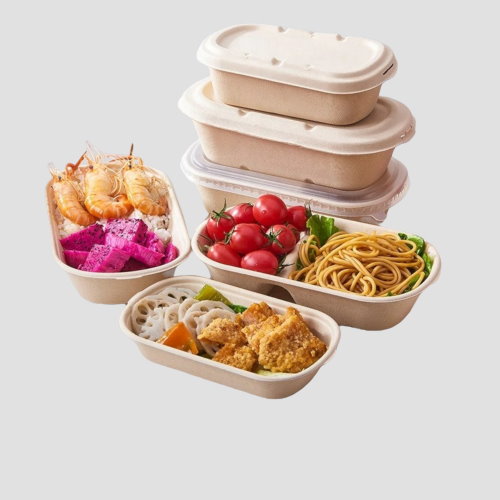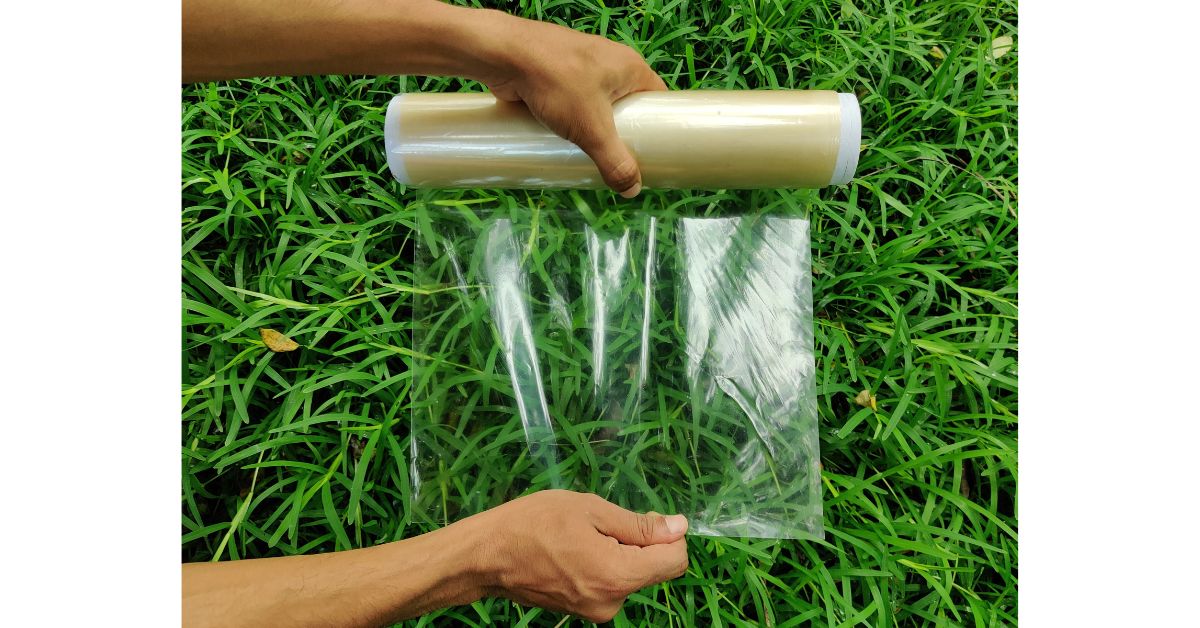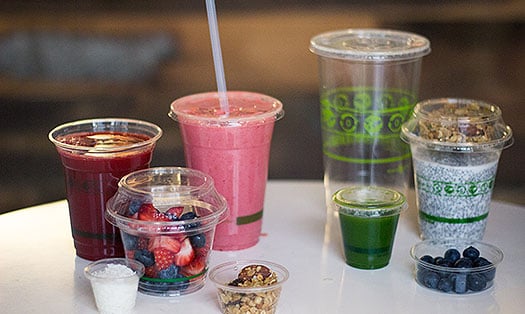Plant-based materials, also known as bio-based materials, are derived from renewable plant sources such as agricultural crops, trees, or other organic matter. These materials are used as alternatives to traditional materials derived from fossil fuels, such as plastics. They can be sourced from various parts of plants, including leaves, stems, seeds, and husks.
Plant-based
materials offer advantages over traditional materials as they are renewable,
have lower carbon footprints, and can potentially be biodegradable or
compostable, depending on their composition. They play a crucial role in
developing sustainable and environmentally friendly alternatives in various
industries, including packaging, textiles, construction, and automotive.
 |
| Importance of Plant Based Materials Credits: Etamine du Lys |
Business Update
Why Choose Plant-Based Packaging for a Sustainable Future?
At Foodiezy, we are committed to promoting
sustainable practices and offering eco-friendly solutions to businesses across
various industries. As the demand for environmentally conscious products and
services continues to rise, it is crucial to consider the impact of packaging
on our planet. In this article, we will explore the numerous reasons why
choosing plant-based packaging is a smart and responsible choice for businesses
looking to reduce their ecological footprint and contribute to a sustainable
future.
1. Environmental Benefits of Plant-Based Packaging
 |
| Sustainable Packaging Design Credits: id8 |
Traditional packaging materials, such as plastic and
polystyrene, have been widely used due to their durability and low cost.
However, they pose significant environmental challenges. Plant-based packaging,
on the other hand, offers several notable benefits:
Reduced Carbon Footprint
Plant-based packaging is typically derived from renewable
resources such as corn, sugarcane, or bamboo. These materials have a
significantly lower carbon footprint compared to their petroleum-based
counterparts. By choosing plant-based packaging, businesses can contribute to
the reduction of greenhouse gas emissions and combat climate change.
Biodegradability and Compostability
One of the key advantages of plant-based packaging is its
ability to biodegrade and compost. Unlike traditional plastics that can persist
in the environment for hundreds of years, plant-based materials break down
naturally, returning to the earth without causing long-lasting harm. This not
only reduces waste in landfills but also helps to preserve our ecosystems.
2. Health and Safety Considerations
Aside from the environmental benefits, plant-based packaging
also offers advantages in terms of health and safety. Here are some key points
to consider:
Chemical-Free Alternative
Traditional packaging materials often contain harmful
chemicals that can leach into the products they hold, posing risks to human
health. Plant-based packaging provides a chemical-free alternative, ensuring
that your products remain free from potential contaminants. This is
particularly important for food and beverage industries where consumer safety
is a top priority.
Allergen-Free and Non-Toxic
Plant-based packaging materials are naturally allergen-free
and non-toxic. This is especially beneficial for industries that cater to
individuals with specific sensitivities or allergies. By utilizing plant-based
packaging, businesses can provide a safer and more inclusive experience for
their customers.
3. Marketability and Consumer Appeal
In addition to the environmental and health benefits,
plant-based packaging can enhance a business's marketability and appeal to
consumers. Here's why:
Growing Demand for Sustainable Products
Consumers are becoming increasingly conscious of their
purchasing decisions and actively seek products that align with their values.
Plant-based packaging demonstrates a commitment to sustainability, which
resonates with environmentally conscious consumers. By prominently highlighting
your use of plant-based packaging, you can attract and retain a growing
customer base that values sustainability.
Positive Brand Image and Differentiation
In a competitive marketplace, a positive brand image and
differentiation are key to standing out from the crowd. By adopting plant-based
packaging, you showcase your brand's commitment to environmental stewardship
and responsible practices. This can help create a unique selling proposition
that sets you apart from competitors and positions your business as a leader in
sustainability.
In this article, we will explore the benefits of plant-based
packaging and highlight seven different types that can elevate your
sustainability efforts.
1. Cornstarch Packaging
Cornstarch packaging is a versatile option that offers
biodegradability and compostability. Derived from renewable corn sources, it
provides an eco-friendly alternative to traditional plastic packaging. Its
flexibility and strength make it suitable for various applications, including
food containers, disposable cutlery, and packaging fillers.
2. Sugarcane Bagasse Packaging
 |
| Credits: Direct Eco Green |
Sugarcane bagasse packaging is made from the fibrous residue
left after sugarcane juice extraction. This type of packaging is not only biodegradable
but also compostable, making it an excellent choice for food packaging and
disposable tableware. Sugarcane bagasse packaging offers durability, moisture
resistance, and a natural aesthetic.
3. Bamboo Packaging
Bamboo packaging is gaining popularity due to its
sustainability and versatility. Bamboo is a fast-growing plant that requires
minimal resources and does not contribute to deforestation. It can be used to
create a wide range of packaging options, such as boxes, trays, and even
beverage containers. Bamboo packaging offers strength, durability, and a unique
visual appeal.
4. Mushroom Packaging
Mushroom packaging, also known as mycelium packaging, is an
innovative solution that utilizes the root structure of mushrooms to create a
biodegradable and compostable packaging material. By growing mycelium on
agricultural waste, it forms a natural and sturdy packaging alternative.
Mushroom packaging is an ideal choice for fragile items and can be molded into
various shapes and sizes.
5. Seaweed Packaging
 |
| Seaweed Packaging Credits: The Better India |
Seaweed packaging is an emerging sustainable option that
harnesses the abundant resources of our oceans. Seaweed-based materials offer
excellent barrier properties, making them suitable for food packaging and other
moisture-sensitive products. Seaweed packaging is biodegradable, renewable, and
has the potential to reduce reliance on traditional plastic packaging.
6. Recycled Paper Packaging
Recycled paper packaging is a widely accessible and
environmentally friendly choice. By utilizing post-consumer waste, recycled
paper packaging helps reduce landfill waste and conserves natural resources. It
is a versatile option that can be customized for various packaging needs,
including boxes, bags, and labels.
7. PLA Packaging
 |
| Credits: Good Start Packaging |
Polylactic acid (PLA) packaging is derived from renewable
resources such as corn starch or sugarcane. It offers similar properties to
traditional plastics but with the added benefit of being compostable and
biodegradable. PLA packaging is suitable for a range of products, including
food containers, cups, and packaging films.
By incorporating any of these plant-based packaging options
into your business operations, you can showcase your commitment to
sustainability and meet the growing demand for eco-friendly products. Not only
will you reduce your environmental impact, but you will also attract
conscientious consumers who prioritize sustainable choices.
Conclusion
Plant-based packaging offers a multitude of benefits for businesses aiming to reduce their environmental impact, prioritize consumer safety, and strengthen their brand image. By choosing sustainable packaging solutions, we can contribute to a greener and more sustainable future for generations to come. At Foodiezy, we are proud to provide high-quality information related to latest knowledge & trends involved in the food business.
Join us in embracing the power of plant-based packaging and
make a positive difference in your industry. Together, we can create a more
sustainable world.
